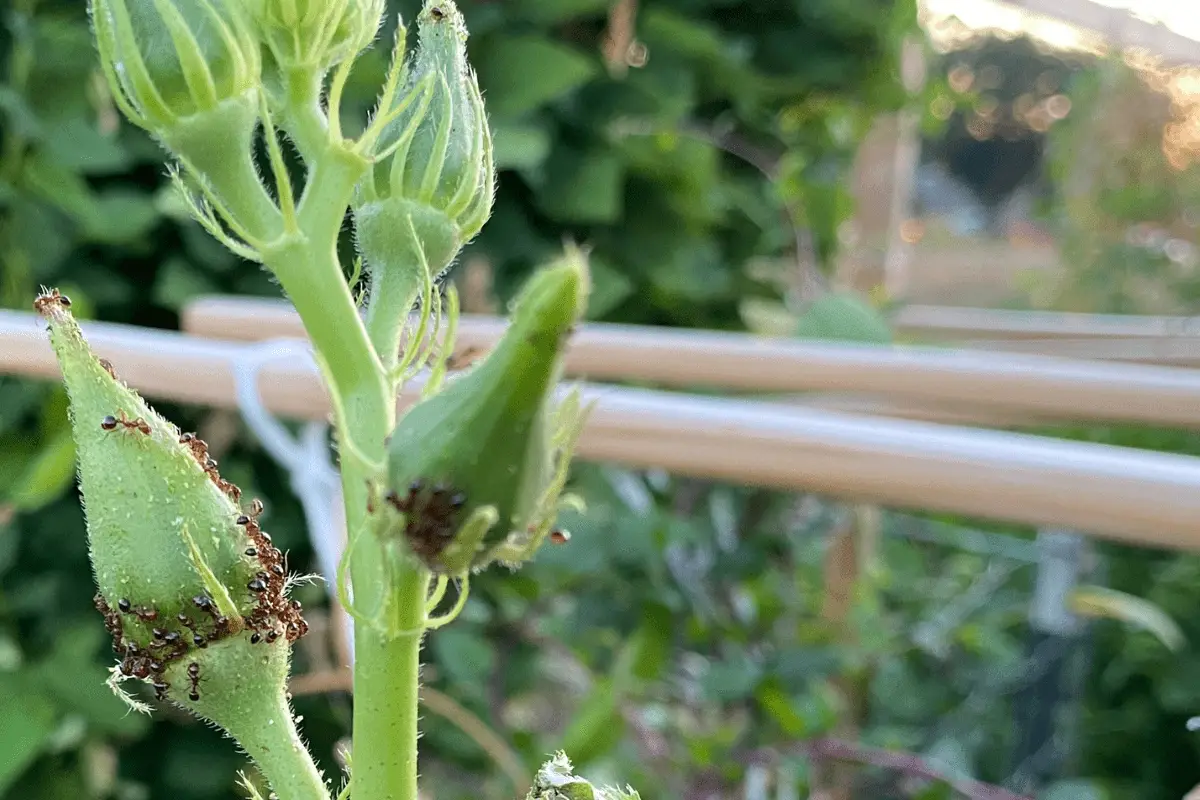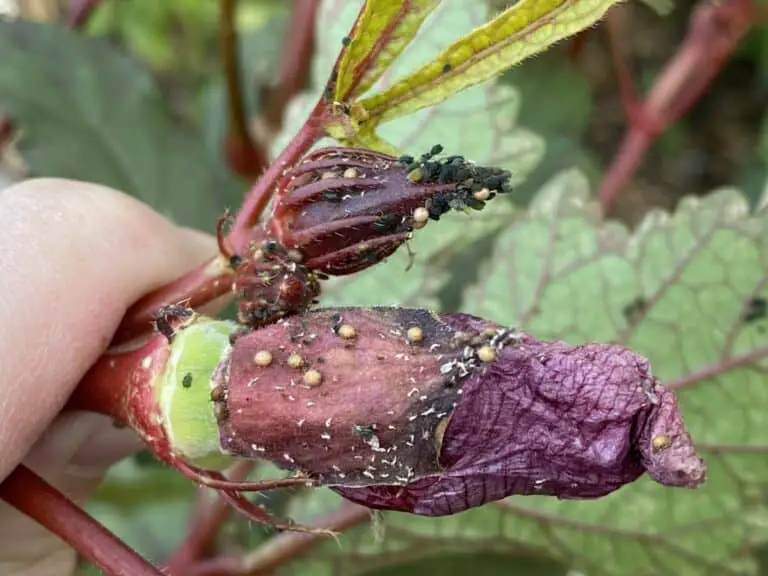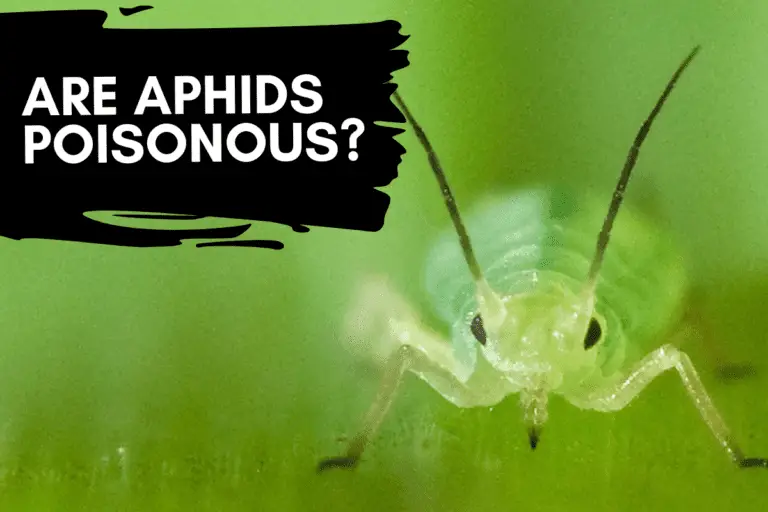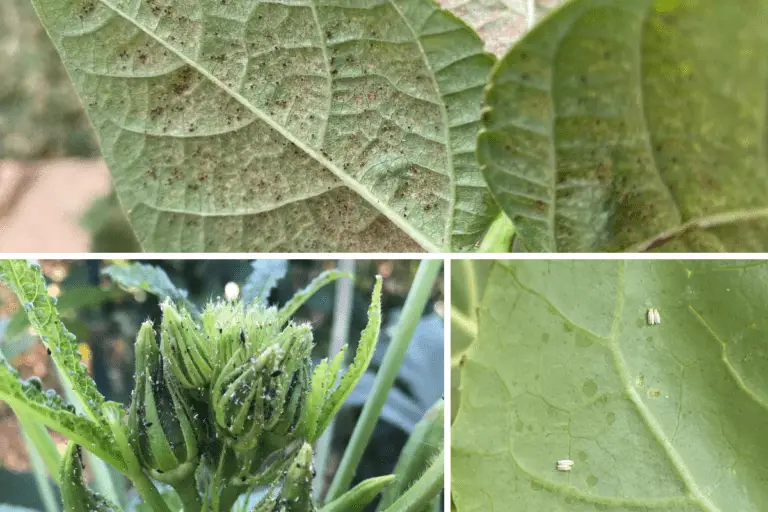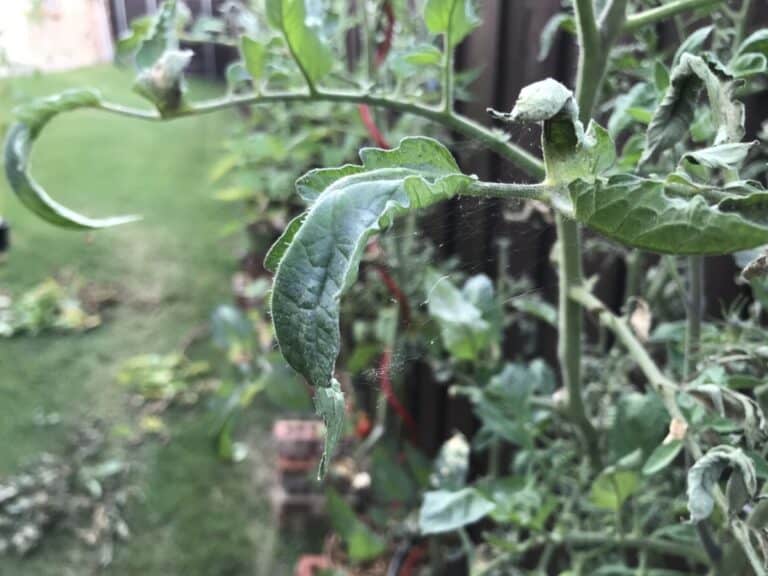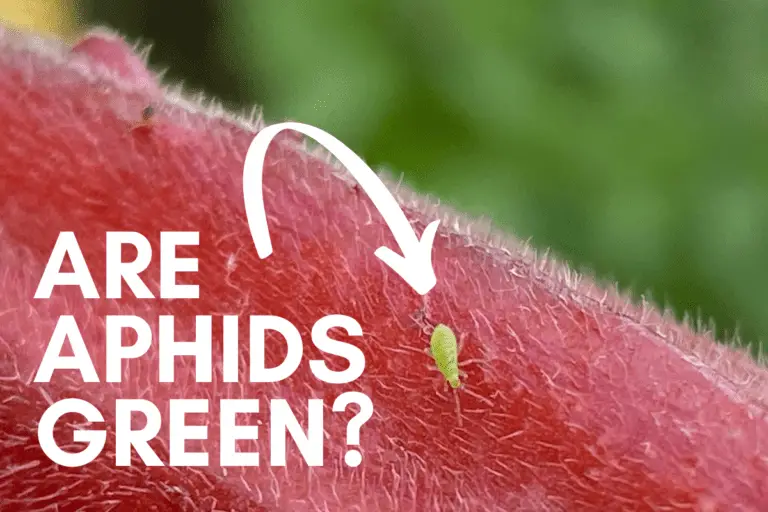Why Do Ants Protect Aphids? 7 Things You Should Know
Have you ever noticed both aphids and ants together in your garden?
This happened to me recently when I observed ants crawling all over an aphid-infested okra plant. I had more than enough okra, so I left the plant alone (instead of treating it with organic insecticidal spray) because I wanted to observe what would happen over time if I did nothing.
What made the experiment even more interesting is that I had another aphid-infested okra plant a few feet away, but on this plant, I saw no signs of ants.
Here’s what I learned:
Ants will protect aphids because they desire the sugary honeydew that aphids secrete while feeding. To protect aphid colonies and thus increase honeydew production, ants will kill off predatory bugs, clear away fungal spores, transport aphids to new places, and protect aphid eggs during winter.
Researchers describe the aphid/ant relationship as one characterized by “mutualism,” which is to say that aphids and ants have developed a symbiotic dependence on each other somewhat akin to the human independence on livestock. This is why researchers often speak of ants as “farmers” who tend to and harvest aphids.
But what makes this relationship so fascinating is not only why ants protect aphids–as we saw above, they do so in order to increase overall honeydew production–but the ways in which ants go about doing so.
To call aphids farmers is perfectly accurate since I think of farming as a complex set of operations that involve expert environmental knowledge, careful planning, and skilled labor. But I personally prefer to think of aphids as ranchers who care deeply about keeping their herds safe and intact and increasing their overall numbers.
In their own ways, ants exhibit both farming and ranching behaviors to protect aphids, so let’s take a closer look at the steps ants will take to care for and keep aphids safe.
Why Do Ants Look After Aphids?
Of course, unlike farmers and ranchers, ants do not actually care for aphids. What they care for is honeydew, but the only way to acquire honeydew is to cultivate healthy, growing aphid colonies.
With that in mind, let’s look at why ants do the things they do and how exactly they work to ensure aphids’ survival (and thus an uninterrupted supply of honeydew). In the end, knowing more about ant behaviors will help you understand various strategies you can use to stop ants and eliminate aphids whenever you find them in and among your garden plants.
1. Ants Protect Aphids from Predatory Bugs
One of the main reasons why ants will seek out aphids and remain among the colonies is their desire to keep preparatory bugs at bay.
In the absence of ants, ladybugs, lacewing larvae, parasitoid wasps, hover flies, and other predatory bugs will provide assistance when it comes to aphid management. Ladybugs and lacewing larvae are voracious predators, capable of eating dozens (if not hundreds) of aphids during their lifetimes. And parasitoid wasps will lay their eggs inside of aphids, a process that results in mummification as the larvae eat aphids from the inside out.
All of these bugs are bad for aphids and thus bad for honeydew production. If ants are present, they kill predatory bugs in order to ensure the survival of the aphid colony.
In fact, a recent study showed that ants decreased the prevalence of predatory bugs by 54% and plant-eating bugs by 27%. This means that ants are not only killing off the beneficial predators. They’re attacking non-predatory bugs as well.
2. Ants Protect Aphids from Damaging Fungi
There’s some interesting research that shows that ants do much more than protect aphids from predatory bugs. They also protect aphids and their colonies from invasive fungi.
Here’s what happened: Researchers watched a group of milkweed aphids and noticed that the ants that were protecting them took drastic measures when a pathogen (Pandora neoaphidis) appeared and threatened the colony.
First, the ants removed pathogen-infected aphids from the colony, literally picking them up and moving them elsewhere–the more ants that were in attendance, the more aphids that were removed.
Second, the ants could tell when an aphid had accidentally come into contact with fungal spores, which could infect the colony if not quickly removed. In certain instances, the ants didn’t remove the aphids from the colony. They instead picked them up and cleaned them with their mouthparts, rotating them in place to ensure that they cleared away all fungal spores.
Check out this video to learn more about this process:
3. Ants Keep Aphids in Place
As I’ve noted in articles on where aphids come from and whether they’re invasive or not, female aphids are typically wingless, but as the year progresses, they have the ability to produce winged versions of themselves. They do this so that the aphid colonies can spread to new host plants, providing additional resources for a growing aphid population.
But here’s the funny thing about ants: They don’t want aphids to fly away. Much like farmers, who keep careful watch over their herds, they want aphids to remain in place because every aphid that leaves the host plant is one less opportunity for honeydew production.
In a study on aphid wing development, researchers realized that ants did more than merely protect aphids from predators or damaging fungi. Surprisingly enough, they had what’s called an “apterizing effect.” This means that aphid colonies tended by ants produce fewer winged aphids than those with no ants present because chemicals transferred through the ants’ glands have hormonal effects on aphids.
But ants have one more, less sophisticated way of keeping aphids in place: They simply chew their wings off.
Simply put, ants recognize that winged aphids can leave the colony, thus depriving the ants of additional honeydew. So when they’re not altering aphids through hormonal means, they resort to more aggressive forms of restraint.
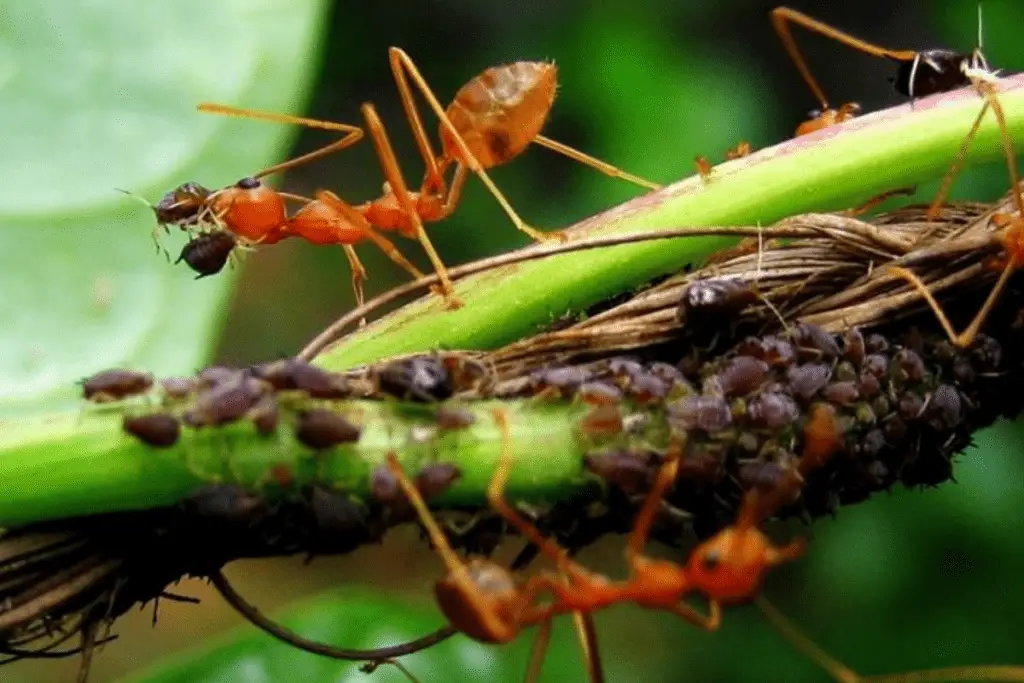
4. Ants Transport Aphids to New Plants
Ants don’t merely desire to keep aphids in place. They’ll also move aphids around as they see fit if they think that, in doing so, they’ll keep the aphid colony intact and guarantee steady honeydew production.
In some instances, ants have been known to carry aphids from one host plant to another to ensure that the aphids can continue feeding, especially if the first host plant has begun to wilt or decay. But aphids have also been known to carry around aphid eggs or to move aphids here and there on the same plant.
The key point is this: If ants think there’s a benefit to moving aphids around, they’ll do just that in order to keep the honeydew flowing.
5. Ants Increase Honeydew Production
Ants protect aphids so as to cultivate them and increase honeydew production, so they need to keep aphids stationary and safe.
These aphids aren’t injured in any way, but they won’t continue to move. They’ll simply start sucking the nutrients out of the plant and producing honeydew as a result.
In the meantime, ants will encourage further honeydew production by stroking the aphids. They’re not technically “milking” them, but the analogy is still fairly accurate in that they’re attempting to prompt aphids to produce more honeydew than they would have done otherwise.
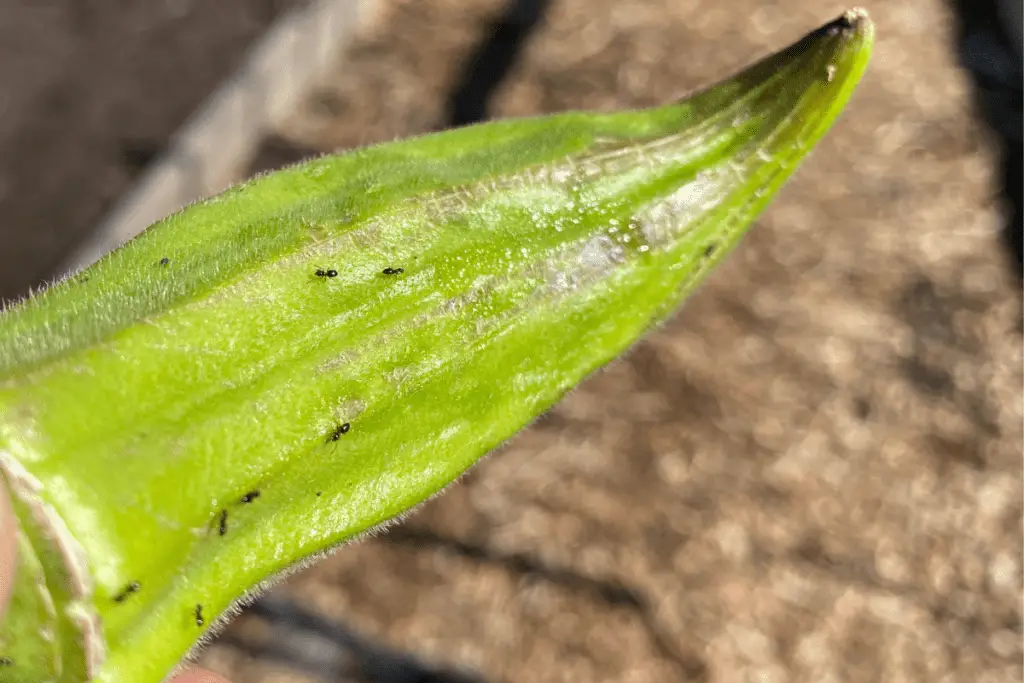
6. Ants Prefer Certain Kinds of Honeydew
But here’s something interesting: Research shows that ants prefer some kinds of honeydew over other kinds of honeydew and thus certain kinds of aphids over other kinds of aphids.
This is important to understand. If you read enough gardening bloggers, you’ll see people write about ants and aphids as if they’re all involved in symbiotic, mutualistic relationships. But this isn’t necessarily the case.
The researchers were looking at two aphid species and realized that ants were drawn to and thus tended one species while ignoring the other species. What they came to understand is that all honeydew is not created equal. The honeydew of poplar leaf aphids (Chaitophorus populialbae) and poplar shoot aphids (Chaitophorus populialbae) had a much higher sugar content (i.e. the trisaccharide melezitose) than did the honeydew of the aspen leaf aphid (Chaitophorus tremulae).
What this shows is that ants have certain preferences when it comes to aphids and their honeydew. With over 4,700 species of aphid spread across the world, there’s very little known about the exact preferences that ants have developed, but it’s clear that, when they have a choice, ants might ignore some aphids in order to tend to others.
7. Ants Protect Aphid Eggs During Winter
In addition to the methods noted above, ants will use their legs to secrete trace chemicals onto the leaves and branches of plants. When aphids come into contact with these chemicals, they’ll often freeze in place.
As I’ve noted in articles on how aphids handle cold weather and survive during the winter months, these garden bugs are fairly cold tolerant, and although they experience high mortality rates during winter (sometimes as high as 80-84%), they’ll bounce back come spring once the remaining aphids begging the reproductive process.
But did you know that, in certain circumstances, ants will provide a helping hand when it comes to keeping aphids safe during the winter?
As researchers have noted, certain species of ant are known for carrying aphid eggs into their nests when cold approaches, then carrying the egg back out once things start to warm up a bit.
Ants know that aphid survival largely depends on egg survival, so they play their part in keeping eggs safe when outside temperatures might otherwise kill the developing larvae.
Do Ants Raise Aphids?
Ants don’t technically raise aphids in that they’re not responsible for overseeing aphid reproduction processes, but they do play a major role in herding aphids together, protecting them from predators, keeping dangerous fungal spores at bay, and ensuring aphid survival during the cold winter months.
In many ways, then, ants are ranchers of the insect world with aphids as their herds. They’ll care for nymphs and adults alike, and they’ll pay special attention to eggs because they instinctively realize that the eggs are necessary for the continuation of the aphid colony.
Will Aphids Die Without Ants?
Just because ants tend to aphids, this doesn’t mean that aphids need ants to thrive. In fact, aphids have probably benefited more from humans over the past 100 years than they have from ants since human activity is responsible for dispersing countless aphid species across the world.
That being said, researchers have found that aphid mortality rates are generally much higher when ants aren’t present because aphid colonies are exposed to both harmful fungal spores as well as numerous predators (such as ladybugs, lacewing larvae, and hover flies) who’d love nothing more than to feast on them or those (like parasitoid wasps) who prefer to lay their eggs inside them.
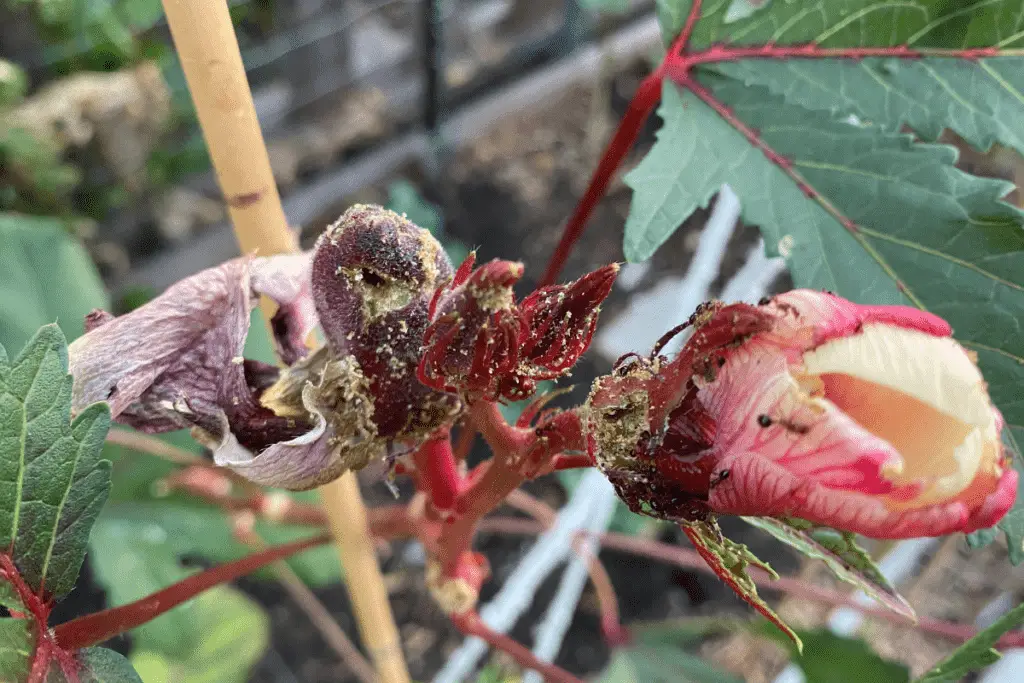
How Do I Keep Ants and Aphids Off My Plants?
I’ve previously written about where aphids come from, how they spread from plant to plant, how to help your plants recover from aphids, and whether you should throw out aphid-infested plants or try to compost them.
But the question I hear most is this one: How do I keep aphids off my plants?
When it comes to aphids, I’ve explained 3 of my preferred methods (water, insecticidal soap, and neem oil) in this article on how to recognize and kill green aphids as well as an additional 3 methods in this article on how to identify and stop black aphids.
But I’ll say a few words about ants because I’ve dealt with plenty of them over the years.
In general, I leave ants alone because I just don’t mind them. They play an important role in my garden’s ecosystem, and I’m happy enough to let them be (unless they’re fire ants).
But if fire ants have taken residence in one of my raised beds–or if I notice ants attending aphids (which is a bad sign for my garden)–then it’s time to take action.
Here are my two preferred steps when it comes to deterring ants:
First, if the ant bed is not among my garden plants, I’ll simply boil a pot of water and pour it over the bed. I’ll then do this several more times throughout the week until I see no more evidence that ants are active in that location.
Second, if boiling water isn’t an option (likely because ants have built a mound among my plants), I’ll dust the ant pile with diatomaceous earth, which is a powdery substance that’s harmless to humans and pets but lethal to bugs.
I’m very careful with DE because it’ll kill most insects who come in contact with it, but I’ve found that it’s effective when applied directly to ant piles.
Want More Information?
If you’re interested in learning more about aphids and aphid management techniques, I recommend checking out these articles:
